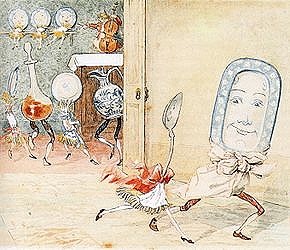Rhyming

"She quickly learned to sing along."
The most memorable poems leave behind the most curious images. A dish credibly runs away with a spoon. A huge egg tumbles off a high wall. An eensy-weensy spider, not a small or tiny one, climbs up the water spout. Tigers burn bright. Roses are roses are roses, and this otherwise redundant, tautological description stands, and taller than most every other attempt to memorialize the rose. Poetry often rhymes, but even when it fails to rhyme, it almost always exudes a rhythm scheme, a cadence which compellingly pulls the reader along. Nothing need be terribly exact unless engaging in some specialized sonnet, restrictive haiku, or bawdy limerick. The so-called nursery rhyme, many of which persist as familiar and reassuring ear worms throughout even long lifetimes, exemplify poetry for me, or po'ms, as I've grown to call these silly little spoutings to better suggest that something's missing but not forgotten from them. They might lack a scholarly decorum but compensate with a warming silliness.
Writing po'ms demands an unteachable skill. While most writing involves a search for explicit meaning, writing po'ms focuses more upon allowing the meaning to find me, more a series of unlikely, often silly associations rather than ever finer explanations. The rhythm pulls the construction along as if a destiny demanded its manifestation. One thing leads to another and the outcome remains unclear until very, very near the end, just before the dish decides to run away with the spoon. However silly each completed "work"—though they're much better described as "play"—might seem, each carries deeply cloaked metaphor, which in prose more often serves the purpose of nailing down meaning but in po'ms, renders them even more ambiguous. This silly ambiguity encourages satisfying interpretations, ones which leave the reader feeling as though they've seen through something, and renders the reader more of an author of their own silly and satisfying experience. The reader's left on the inside of an inside joke.
Writing po'ms need not have a deeper purpose, though one often emerges from the act of attempting to create one. I'm up in the morning, remembering that it's my older sister's birthday, and certain only that I hold the obligation to conjure up a fresh po'm in acknowledgement if not celebration. I'll try my best to talk myself out of even entering the mysterious cavern from which these dalliances emerge, for I enter with only the urge to have completed one and an overly-clear conviction of a definite deadline looming. Wanting to have completed amounts to a lousy purpose for engaging in any activity, not just writing a po'm, and the deadline awareness adds a useful sense of urgency. I'll first attempt to satisfy both urges through focused procrastination. Amazing how many urgent errands present themselves whenever a po'm wants manifesting! I'll stalk the elusive starting point, though actually finding it hardly ever matters. The point of stalking the elusive starting point is not to find it, but to reject a raft of lousy ones. I should have come very close to exhausting every reasonable possibility before finally beginning where I find myself then, washed up and washed out, most of my cleverness apparently wasted in concerted procrastination and begrudging preparation, all apparently for naught.
The starting point eventually finds me, emerging from a sense that I might be starting a cascade of utter mediocrity previously unmatched in all human history, which seems quite distinguishing. I'm not proposing a sonnet or a haiku or even a bawdy limerick, but a standard, more likely a substantially sub-standard, bit of writing. It's a serious enough crossroad that I dare not continue taking it too awfully seriously. I'm not the Bard of anything, still just a scribbler setting to pour a few emotions on a page. I must have written a thousand by now, each initially as unlikely to amount to anything as any newborn. Several bellyflopped yet still managed to make a positively appreciated impression. When writing po'ms, the po't might well receive more than a condescending 'E' for effort, but a more grateful 'E' for emotional content.
The metaphors emerge as the words seem to insist upon. Sometimes an infamous Orange presents itself to pre-disqualify whatever might next follow. Dead ends and black boxes abound and some might remain in the so-called finished work, depending. At root, each po'm seems more song than sonnet, a melody tacitly backing the foreground lyrics. The whole experience inductive, intended to elicit a surprise giggle or two. The writing's not through until the inside joke's secreted inside along with the key to unlock the strongbox. The finished work should properly be a sensory more than intellectual experience. It implies more than it actually says. Rhyming was the least concern when creating it.
I might smell like a skunk but at least I don't smell like a Little Girl,
I might smell like a skunk but at least I don't smell like a Little Girl,
'Cause Little Girls smell like cinnamon toast
with those cutesy little voices, oh what a joke!
I might smell like a skunk but at least I don't smell like a Little Girl!
This was an unlikely love song I wrote for my granddaughter Kylie, more Rhyming than reason and more emotion than sense. She quickly learned to sing along.
©2020 by David A. Schmaltz - all rights reserved


